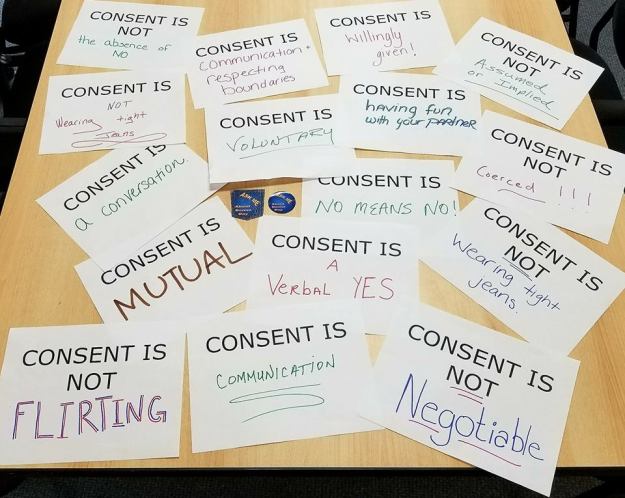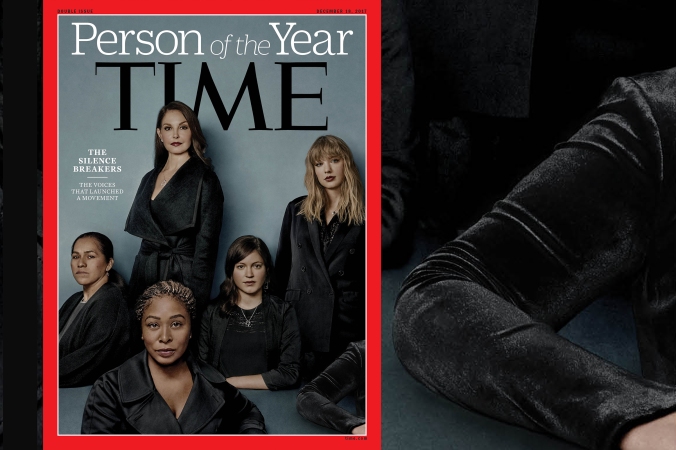April is Sexual Assault Awareness Month! There are so many ways you can be a part of the solution to end sexual assault. Below I’ve compiled a list of 8 ways to combat sexual assault this month (and every month):
- Challenge victim blaming.
When you hear comments like, “they were asking for it” or “they shouldn’t have gotten that drunk” or “what did they expect to happen?”, you can respond by saying that no matter what someone is doing or how someone looks or behaves, no one ever deserves or asks to be sexually assaulted. We can be held responsible for our own actions, but we are not responsible for what someone does to us when we are vulnerable. - Talk about consent!
Sometimes the conversations around sexual assault can seem very daunting and heavy. Consent is a lot easier to talk about and yet most people don’t. If you’re a parent, you can talk to your kids about boundaries and respecting people’s different boundaries. Even as adults we need a reminder of this. Whether it’s physical touching, borrowing someone’s phone, or talking about something personal or private, we always need to check in with someone before doing anything that can cross any type of boundary.

- Educate yourself and others.
Take some time to learn about sexual assault, consent, and the impact of sexual violence in our communities whether by attending a training, or viewing a documentary or screening in your area. I Am Evidence, Audrey & Daisy, Anita: Speaking Truth to Power are all documentaries about sexual assault. You can also ask for a training at your company or place of work from your local sexual assault agency. As an educator at my agency, I (and my colleagues in my department) go into both educational and professional settings to inform the public about these issues and engage in meaningful discussion. - Volunteer for your local sexual assault agency/organization.
Volunteering for a sexual assault agency or organization can be a much longer process than some may think. For our agency, it is a 40 hour training. Most agencies are similar. If this topic is something you are passionate about and have the time to dedicate to, feel free to reach out to your local agency to see if they have any available trainings. - Donate to your local sexual assault agency/organization.
If volunteering is not something you want to do or can fit into your schedule, there are many other ways you can help without going through a training. You can donate money or items that the agency is looking for. For example, we always accept clothes for survivors who go to the hospital to get a forensic evidence collection kit done. Our volunteers/advocates bring care packages to the hospitals complete with sweatpants, a sweatshirt or t-shirt, snacks, water, magazines, a blanket, and any other items that may make that experience a little bit more comfortable. - Legislative advocacy.
Find out what your local/state organizations are advocating for in the upcoming legislative session and offer to email or call your senators and representatives to help. In Connecticut we are in the process of advocating to pass H.B. 5246, An Act Eliminating the Statute of Limitation in the Case of Sexual Assault. Completely eliminating the criminal statute of limitations will give both victims and prosecutors the time they need to bring justice, as justice should not have an expiration date. Connecticut’s statute of limitations for sexual assault crimes should be removed to fully acknowledge the impact of trauma on survivors of sexual violence and the barriers they face when reporting, and to hold the persons who commit acts of sexual violence accountable. - Participate in Denim Day.
The campaign was originally triggered by a ruling by the Italian Supreme Court where a rape conviction was overturned because the justices felt that since the victim was wearing tight jeans she must have helped her rapist remove her jeans, thereby implying consent. The following day, the women in the Italian Parliament came to work wearing jeans in solidarity with the victim. Denim Day is a rape prevention education campaign where community members, elected officials, businesses and students make a social statement with their fashion by wearing jeans on this day as a visible means of protest against the misconceptions that surround sexual assault. This year’s Denim Day is April 25, 2018. - Support survivors.
Chances are, you know a survivor of sexual assault and you may not even realize it. So, be open and compassionate to those around you. This time of the year may be sensitive to some or triggering for others, or maybe nothing at all. Be mindful of how prevalent of an issue this is, and open your heart to those around you to offer support. Let your loved ones know you love them and your metaphorical door is open to talk. You never know who it may help.

Always remember to do your part to stop the hurt.

